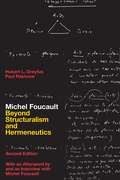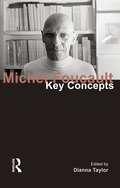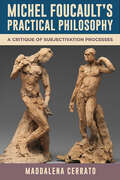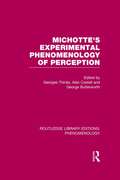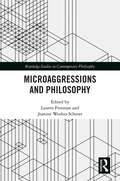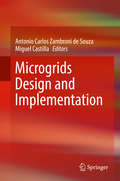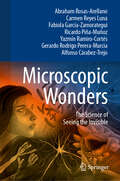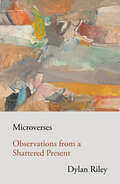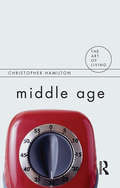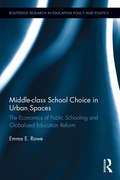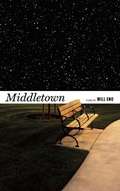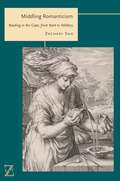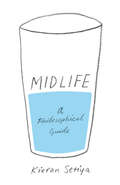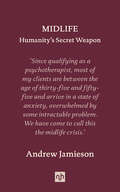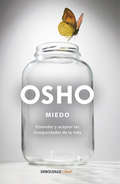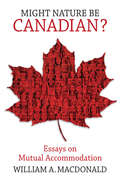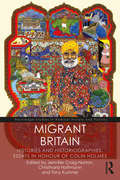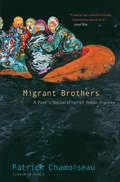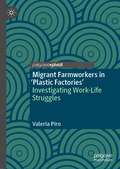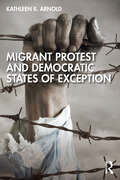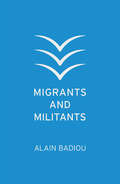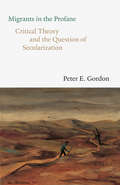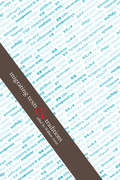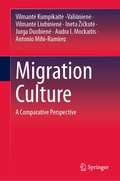- Table View
- List View
Michel Foucault: Beyond Structuralism and Hermeneutics, Second Edition
by Paul Rabinow Hubert L. DreyfusThis book, which Foucault himself has judged accurate, is the first to provide a sustained, coherent analysis of Foucault's work as a whole. To demonstrate the sense in which Foucault's work is beyond structuralism and hermeneutics, the authors unfold a careful, analytical exposition of his oeuvre. They argue that during the of Foucault's work became a sustained and largely successful effort to develop a new method—"interpretative analytics"—capable fo explaining both the logic of structuralism's claim to be an objective science and the apparent validity of the hermeneutical counterclaim that the human sciences can proceed only by understanding the deepest meaning of the subject and his tradition. "There are many new secondary sources [on Foucault]. None surpass the book by Hubert Dreyfus and Paul Rabinow. . . . The American paperback edition contains Foucault's 'On the Genealogy of Ethics,' a lucid interview that is now our best source for seeing how he construed the whole project of the history of sexuality. "—David Hoy, London Review of Books
Michel Foucault: Key Concepts (Key Concepts)
by Dianna TaylorMichel Foucault was one of the twentieth century's most influential and provocative thinkers. His work on freedom, subjectivity, and power is now central to thinking across an extraordinarily wide range of disciplines, including philosophy, history, education, psychology, politics, anthropology, sociology, and criminology. "Michel Foucault: Key Concepts" explores Foucault's central ideas, such as disciplinary power, biopower, bodies, spirituality, and practices of the self. Each essay focuses on a specific concept, analyzing its meaning and uses across Foucault's work, highlighting its connection to other concepts, and emphasizing its potential applications. Together, the chapters provide the main co-ordinates to map Foucault's work. But more than a guide to the work, "Michel Foucault: Key Concepts" introduces readers to Foucault's thinking, equipping them with a set of tools that can facilitate and enhance further study.
Michel Foucault’s Practical Philosophy: A Critique of Subjectivation Processes (SUNY series in Contemporary French Thought)
by Maddalena CerratoOffers a holistic approach to Michel Foucault's thought, introducing the idea of practical philosophy as an original interpretative framework.Michel Foucault's thought, Maddalena Cerrato writes, may be understood as practical philosophy. In this perspective, political analysis, philosophy of history, epistemology, and ethics appear as necessarily cast together in a philosophical project that aims to rethink freedom and emancipation from domination of all kinds. The idea of practical philosophy accounts for Foucault's specific approach to the object, as well as to the task of philosophy, and it identifies the perspective that led him to consider the question of subjectivity as the guiding thread of his work. Overall, Cerrato shows the deep consistency underlying Foucault's reflection and the substantial coherence of his philosophical itinerary, setting aside all the conventional interpretations that pivot on the idea that his thought underwent a radical "turn" from the political engagement of the question of power toward an ethical retrieval of the question of subjectivity.
Michotte's Experimental Phenomenology of Perception (Routledge Library Editions: Phenomenology)
by Georges Thinès, Alan Costall and George ButterworthThis volume of collected papers, with the accompanying essays by the editors, is the definitive source book for the work of this important experimental psychologist. Originally published in 1991, it offered previously inaccessible essays by Albert Michotte on phenomenal causality, phenomenal permanence, phenomenal reality, and perception and cognition. Within these four sections are the most significant and representative of the Belgian psychologist's research in the area of experimental phenomenology. Extremely insightful introductions by the editors are included that place the essays in context. Michotte's ideas have played an important role in much research on the development of perception, and his work on social perception continues to be influential in social psychology. The book also includes some lesser-known aspects of his work that are equally important; for example, a remarkable set of articles on pictorial analysis.
Microaggressions and Philosophy (Routledge Studies in Contemporary Philosophy)
by Lauren Freeman Jeanine Weekes SchroerThis is the first book to offer a philosophical engagement with microaggressions. It aims to provide an intersectional analysis of microaggressions that cuts across multiple dimensions of oppression and marginalization, and to engage a variety of perspectives that have been sidelined within the discipline of philosophy. The volume gathers a diverse group of contributors: philosophers of color, philosophers with disabilities, philosophers of various nationalities and ethnicities, and philosophers of several gender identities. Their unique frames of analysis articulate both how the concept of microaggressions can be used to clarify and sharpen our understanding of subtler aspects of oppression and how analysis, expansion, and reconceiving the notion of a microaggression can deepen and extend its explanatory power. The essays in the volume seek to defend microaggressions from common critiques and to explain their impact beyond the context of college students. Some of the guiding questions that this volume explores include, but are not limited to, the following: Can microaggressions be established as a viable scientific concept? What roles do microaggressions play in other oppressive phenomena like transphobia, fat phobia, and abelism? How can epistemological challenges around microaggressions be addressed via feminist theory, critical race theory, disability theory, or epistemologies of ignorance? What insights can be gleaned from intersectional analyses of microaggressions? Are there domain-specific analyses of microaggressions that would give insight to features of that domain, i.e. microaggressions related to sexuality, athletics, immigration status, national origin, body type, or ability. Microaggressions and Philosophy features cutting-edge research on an important topic that will appeal to a wide range of students and scholars across disciplines. It includes perspectives from philosophy of psychology, empirically informed philosophy, feminist philosophy, critical race theory, disability theory, philosophy of language, philosophy of science, and social and political philosophy.
Microgrids Design and Implementation
by Antonio Carlos Zambroni de Souza Miguel CastillaThis book addresses the emerging trend of smart grids in power systems. It discusses the advent of smart grids and selected technical implications; further, by combining the perspectives of researchers from Europe and South America, the book captures the status quo of and approaches to smart grids in a wide range of countries. It describes the basic concepts, enabling readers to understand the theoretical aspects behind smart grid formation, while also examining current challenges and philosophical discussions. Like the industrial revolution and the birth of the Internet, smart grids are certain to change the way people use electricity. In this regard, a new term – the “prosumer” – is used to describe consumers who may sometimes also be energy producers. This is particularly appealing if we bear in mind that most of the distributed power generation in smart grids does not involve carbon emissions. At first glance, the option of generating their own power could move consumers to leave their current energy provider. Yet the authors argue that doing so is not a wise choice: utilities will play a central role in this new scenario and should not be ignored.
Microscopic Wonders: The Science of Seeing the Invisible
by Abraham Rosas-Arellano Carmen Reyes Luna Fabiola García-Zamorategui Ricardo Piña-Muñoz Yazmín Ramiro-Cortés Gerardo Rodrigo Perera-Murcia Alfonso Cárabez-TrejoThis book takes the reader on a visual journey of the microscope and shares exciting stories about its development and the new technologies that exist that renders the invisible visible. The book begins with the history of microscopy and follows with the basics of various types of microscopy: brightfield, widefield, confocal, transmission electron, and scanning electron. All chapters feature stunning visuals. The history of the microscope is illustrated with paintings in the style of tattoos by tattoo artist Yingfayang tattoo, and the later chapters pair computer designed images and photography to stunning effect, passing on to the reader an appreciation not only for the scientific possibilities of microscopy, but also its artistic possibilities.
Microverses: Observations from a Shattered Present
by Dylan RileyShort essays of social theory for damaged times, encompassing intellectual history, philosophy and cultureMicroverses comprises over a hundred short essays inviting us to think about society – and social theory – in new ways. Lockdown created the conditions for what Adorno once termed &‘enforced contemplation&’. Dylan Riley responded with the tools of his trade, producing an extraordinary trail of notes exploring how critical sociology can speak to this troubled decade. Microverses analyses the intellectual situation, the political crisis of Trump&’s last months in office, and love and illness in a period when both were fraught with the public emergency of the coronavirus.Riley brings the theoretical canon to bear on problems of intellectual culture and everyday life, working through Weber and Durkheim, Parsons and Dubois, Gramsci and Lukács, MacKinnon and Fraser, to weigh sociology&’s relationship to Marxism and the operations of class, race and gender, alongside discursions into the workings of an orchestra and the complicatedness of taking a walk in a pandemic.Invitations rather than finished arguments, the notes attempt to recover the totalising perspective of sociology – the ability to see society in the round, as though from the outside – and to recuperate what Paul Sweezy described as a sense of the &‘present as history&’.
Middle Age (The Art of Living)
by Christopher HamiltonMiddle age, for many, marks a key period for a radical reappraisal of one's life and way of living. The sense of time running out, both from the perspective that one's life has ground to a halt, and from the point of view of the greater closeness of death, and the sense of loneliness engendered by the compromised and wasteful nature of life, become ever clearer in mid-life, and can lead to a period of dramatic self doubt.In this book, the philosopher Christopher Hamilton (early 40s) explores the moods, emotions and experiences of middle age in the contemporary world, seeking to describe and analyze that period of life philosophically. Hamilton draws on his own personal experiences of turning 40 as well as a wide range of sources - from the philosophical writings of Schopenhauer, Nietzsche, Hegel, Heidegger to the literature of Tolstoy, Dostoevsky, Conrad and the films of Woody Allen - to offer us a philosophy of middle age.Some of the many fascinating themes explored include the strong sense of nostalgia experienced in mid-life, of loss for one's youth, and of regret, the sense that life has become boring, the recognition that one can never fully escape feelings of guilt, and - central to the experience of middle age - the question of what is the point of going on at all. In the light of the 'melancholy wisdom' of mid-life Hamilton suggests that pleasure becomes much more important than at previous stages of life and he shows that the enjoyment of pleasure can be something noble.Insightful, entertaining, and thought-provoking, "Middle Age" is fascinating reading and for anyone heading for a 'mid-life crisis' it is much cheaper than buying a sports car.
Middle-class School Choice in Urban Spaces: The economics of public schooling and globalized education reform (Routledge Research in Education Policy and Politics)
by Emma E. RoweMiddle-class School Choice in Urban Spaces examines government-funded public schools from a range of perspectives and scholarship in order to examine the historical, political and economic conditions of public schooling within a globalized, post-welfare context. In this book, Rowe argues that post-welfare policy conditions are detrimental to government-funded public schools, as they engender consistent pressure in rearticulating the public school in alignment with the market, produce tensions in serving the more historical conceptualizations of public schooling, and are preoccupied by contemporary profit-driven concerns. Chapters focus on public schooling from different global perspectives, with examples from Chile and the US, to examine how various social movements encapsulate ideologies around public schooling. Rowe also draws upon a rich, five-year ethnographic study of campaigns lobbying the Victorian State Government in Australia for a brand-new, local-specific public school. Critical attention is paid to the public school as a means to achieve empowerment and overcome discrimination, and both a local and global lens are used to identify how parents choose the public school, the values they attach to it, and the strategies they use to obtain it. Also considered, however, are how quality gaps, distances and differences between public schools threaten to undermine the democracy of education as a means for individuals to be socially mobile and escape poverty. This book makes an important contribution to our understanding of global social movements and activism around public education. As such, it will be of key interest to researchers, academics and postgraduate students in the field of education, specifically those working on school choice, class and identity, as well as educational geography.
Middletown
by Will Eno"Will Eno is an original, a maverick wordsmith whose weird, wry dramas gurgle with the grim humor and pain of life."-GuardianA moving and funny new play exploring the universe of a small American town. As a friendship develops between longtime resident John Dodge and new arrival Mary Swanson, the lives of the inhabitants of Middletown intersect in strange and poignant ways in a journey that takes them from the local library to outer space and points between.
Middling Romanticism: Reading in the Gaps, from Kant to Ashbery (Lit Z)
by Zachary SngRomanticism is often understood as an age of extremes, yet it also marks the birth of the modern medium in all senses of the word. Engaging with key texts of the romantic period, the book outlines a wide-reaching project to re-imagine the middle as a constitutive principle. Sng argues that Romanticism dislodges such terms as medium, moderation, and mediation from serving as mere self-evident tools that conduct from one pole to another. Instead, they offer a dwelling in and with the middle: an attention to intervals, interstices, and gaps that make these terms central to modern understandings of relation.
Midlife: A Philosophical Guide
by Kieran SetiyaPhilosophical wisdom and practical advice for overcoming the problems of middle ageHow can you reconcile yourself with the lives you will never lead, with possibilities foreclosed, and with nostalgia for lost youth? How can you accept the failings of the past, the sense of futility in the tasks that consume the present, and the prospect of death that blights the future? In this self-help book with a difference, Kieran Setiya confronts the inevitable challenges of adulthood and middle age, showing how philosophy can help you thrive.You will learn why missing out might be a good thing, how options are overrated, and when you should be glad you made a mistake. You will be introduced to philosophical consolations for mortality. And you will learn what it would mean to live in the present, how it could solve your midlife crisis, and why meditation helps.Ranging from Aristotle, Schopenhauer, and John Stuart Mill to Virginia Woolf and Simone de Beauvoir, as well as drawing on Setiya’s own experience, Midlife combines imaginative ideas, surprising insights, and practical advice. Writing with wisdom and wit, Setiya makes a wry but passionate case for philosophy as a guide to life.
Midlife: Humanity's Secret Weapon
by Andrew JamiesonA radical new take on one of humanity's most misunderstood periods of transition: the midlife crisis.Only two species of mammal have a post-reproductive life that lasts longer than their reproductive life: killer whales, whose elders are able to sniff out food supplies over vast oceanic distances to keep their pods fed, and Homo sapiens. While the evolutionary purpose of the killer whale&’s extensive life seems clear, what is the point of ours?This was a question that intrigued the psychoanalyst Carl Jung, who observed that if a culture is to maintain its deepest, profoundest roots while moving forward to embrace the challenges of historical and technological change, it needs to find an equilibrium between the energy, vigor, and creativity of those in the ego-driven first half of life and the experience, dignity, and wisdom of those in the second. But to make it to that second half of life, we need to traverse the dreaded middle years, when so many of us find ourselves discontented with our jobs, unhappy in our relationships, and lamenting our fetishized youths.In this highly readable and groundbreaking new book, the psychoanalyst Andrew Jamieson examines the Jungian concept of the midlife crisis to show how it is an essential evolutionary and social rite of passage that we all must proceed through—a set of challenges that we either take advantage of or ignore, depending on whether our complex or neurosis blocks this developmental impulse.Drawing on history, psychology, science, and literature, Jamieson shows just how ubiquitous, and crucial, the &“midlife crisis&” is, and the devastating consequences for society at large if we continue to regard it as something we can, and should, avoid.
Miedo
by Osho OshoLa vida es inseguridad. Cada momento nos lleva a una inseguridad cada vez más profunda. Es un juego en el que nadie sabe cuál será el siguiente paso. ¡En esto radica la belleza de la existencia! Si fuera predecible, no valdría la pena vivir la vida; si todo fuera tal y como deseáramos que fuese y no hubiese lugar para la incertidumbre, no seríamos seres humanos sino máquinas, ya que solo para ellas todo es seguro y cierto.El hombre vive en libertad. La libertad necesita inseguridad e incertidumbre.En el interior del libro, el lector encontrará el código de descarga de una meditación guiada.
Might Nature Be Canadian?: Essays on Mutual Accommodation
by William A. MacdonaldMutual accommodation is about co-operation, compromise, and inclusion. It's a big idea, equal to freedom, science, and compassion. The postwar global economic order led by the United States is one of the greatest historic achievements of mutual accommodation, yet it is now at risk from the centrifugal forces that have led to populism. Today, to many nations and people, Canada is the model country driven by successful mutual accommodation. In Might Nature Be Canadian? William Macdonald explores the theme of mutual accommodation with a close lens on the Canadian experience. Canada has a drive toward mutual accommodation. The United States has a strong drive toward division. There has always been a divergence of ideologies between the two countries. The United States now appears to view the world as a never-ending struggle, which has become greater since 2000, between good and evil, while Canada, by contrast, leans toward the idea that there is an underlying order at the heart of things. Canada has always faced strong limits in creatively overcoming a challenging geography and French/English language differences within its own borders; on the other hand the United States sees itself as a country with virtually no limits. Throughout its history Canada's drive toward mutual accommodation, stronger than that of any other country, has allowed its increasingly diverse citizens to live together peacefully and successfully, even as they retain their own culture, language, and religion. Nature can be described as simultaneously either/or and both/and. Is there something fundamentally Canadian about this? Taking inspiration from British philosopher Alfred North Whitehead, who said that "civilization is the triumph of persuasion over force," Macdonald argues that the urgent spread of mutual accommodation, a charge led by Canada, is central to achieving a bearable world for everyone.
Might Nature Be Canadian?: Essays on Mutual Accommodation
by William A. MacdonaldMutual accommodation is about co-operation, compromise, and inclusion. It's a big idea, equal to freedom, science, and compassion. The postwar global economic order led by the United States is one of the greatest historic achievements of mutual accommodation, yet it is now at risk from the centrifugal forces that have led to populism. Today, to many nations and people, Canada is the model country driven by successful mutual accommodation. In Might Nature Be Canadian? William Macdonald explores the theme of mutual accommodation with a close lens on the Canadian experience. Canada has a drive toward mutual accommodation. The United States has a strong drive toward division. There has always been a divergence of ideologies between the two countries. The United States now appears to view the world as a never-ending struggle, which has become greater since 2000, between good and evil, while Canada, by contrast, leans toward the idea that there is an underlying order at the heart of things. Canada has always faced strong limits in creatively overcoming a challenging geography and French/English language differences within its own borders; on the other hand the United States sees itself as a country with virtually no limits. Throughout its history Canada's drive toward mutual accommodation, stronger than that of any other country, has allowed its increasingly diverse citizens to live together peacefully and successfully, even as they retain their own culture, language, and religion. Nature can be described as simultaneously either/or and both/and. Is there something fundamentally Canadian about this? Taking inspiration from British philosopher Alfred North Whitehead, who said that "civilization is the triumph of persuasion over force," Macdonald argues that the urgent spread of mutual accommodation, a charge led by Canada, is central to achieving a bearable world for everyone.
Migrant Britain: Histories and Historiographies: Essays in Honour of Colin Holmes (Routledge Studies in Radical History and Politics)
by Tony Kushner Jennifer Craig-Norton Christhard HoffmannBritain has largely been in denial of its migrant past - it is often suggested that the arrivals after 1945 represent a new phenomenon and not the continuation of a much longer and deeper trend. There is also an assumption that Britain is a tolerant country towards minorities that distinguishes itself from the rest of Europe and beyond. The historian who was the first and most important to challenge this dominant view is Colin Holmes, who, from the early 1970s onwards, provided a framework for a different interpretation based on extensive research. This challenge came not only through his own work but also that of a 'new school' of students who studied under him and the creation of the journal Immigrants and Minorities in 1982. This volume not only celebrates this remarkable achievement, but also explores the state of migrant historiography (including responses to migrants) in the twenty-first century.
Migrant Brothers: A Poet's Declaration of Human Dignity
by Patrick Chamoiseau Matthew Amos Fredrik Rönnbäck“If justice had a Jericho trumpet, Chamoiseau would be it.”—Junot Díaz <P><P>As migrants embark on perilous journeys across oceans and deserts in pursuit of sanctuary and improved living conditions, what is the responsibility of those safely ensconced in the nations they seek to enter? <P>Moved by repeated tragedies among immigrants attempting to enter eastern and southern Europe, Patrick Chamoiseau assails the hypocrisy and detachment that allow these events to happen. Migrant Brothers is an urgent declaration of our essential interconnectedness that asserts the necessity to understand one another as part of one human community, regardless of national origin.
Migrant Farmworkers in 'Plastic Factories’: Investigating Work-Life Struggles
by Valeria PiroThis book provides a fine-grained ethnographic examination of the everyday negotiations and conflicts taking place in greenhouses and packinghouses in an agricultural district in south-eastern Italy (Sicily). In a highly competitive global scenario, driven by multinational corporations and large retailers, small and medium-sized farms largely rely on migrant labour to fill their demand for casualized, flexible and low-paid jobs. By taking the reader into the ‘plastic factories’ where the author was hired as a farmworker, this book sheds light on the struggles – around the employment contract, the wage and the body – which take place every day between employers and employees. The book contributes to broadening the understanding of the dynamics innervating food production worldwide by recognizing the pivotal role of migrant labour not only as a factor in the restructuring of global supply chains, but also as an actor shaping these processes through its own unpredictable strategies.
Migrant Protest and Democratic States of Exception
by Kathleen R. ArnoldRecognizing the radical disparity between migration/border policy and constitutional law "inside these borders," Kathleen R. Arnold focuses on two main forms of migrant protest to explore the meaning of resistance in a sovereign context: self-harming protest by detainees and faith-based sanctuary of individuals scheduled for detention. This activism creates a "democratic state of exception," interrupting the legal process, altering discretionary forms of sovereign power, and enacting rights not formally granted; these efforts go beyond the assertion of liberal rights or merely restoring the rule of law (even if these are goals), challenging the warfare state while constituting a demos that is formally illegible. Migrant Protest and Democratic States of Exception will be of interest to scholars, migrant advocacy professionals (including INGO and IGO officers), graduate students, and advanced undergraduate students in a variety of fields from legal studies to forced migration and refugee studies; political science, human rights, protest history and contemporary movements.
Migrants and Militants
by Alain BadiouThe question of migration has come to dominate the news agenda in many countries, but what does the word ‘migrant’ really mean today and how should we respond to those who are labelled ‘migrants’? In this short book Alain Badiou argues that our way of thinking about migration should be governed both by an ethical duty to welcome the migrant in the name of hospitality and also by the urgent need to put an end to the global capitalist oligarchy that has produced the migrant as a figure of contemporary crisis. For the ‘migrant,’ argues Badiou, is in fact a nomadic proletarian. Today, our homeland is the world, and any meaningful politics must include those who come to us and who represent the universal nomadic proletariat. Writing with the rigor, clarity, and polemical flair that have made him one of the world’s most influential philosophers, and drawing on a rich body of material including contemporary poetry and the words of an anonymous migrant, Badiou develops a powerful riposte to those who have stoked the fear of migrants and exploited the migration question for political ends.
Migrants in the Profane: Critical Theory and the Question of Secularization (The Franz Rosenzweig Lecture Series)
by Peter E. GordonA beautifully written exploration of religion’s role in a secular, modern politics, by an accomplished scholar of critical theoryMigrants in the Profane takes its title from an intriguing remark by Theodor W. Adorno, in which he summarized the meaning of Walter Benjamin’s image of a celebrated mechanical chess-playing Turk and its hidden religious animus: “Nothing of theological content will persist without being transformed; every content will have to put itself to the test of migrating in the realm of the secular, the profane.” In this masterful book, Peter Gordon reflects on Adorno’s statement and asks an urgent question: Can religion offer any normative resources for modern political life, or does the appeal to religious concepts stand in conflict with the idea of modern politics as a domain free from religion’s influence? In answering this question, he explores the work of three of the Frankfurt School’s most esteemed thinkers: Walter Benjamin, Max Horkheimer, and Theodor W. Adorno. His illuminating analysis offers a highly original account of the intertwined histories of religion and secular modernity.
Migrating Texts and Traditions (Actexpress Ser.)
by William SweetThere can be little dispute that culture influences philosophy: we see this in the way that classical Greek culture influenced Greek philosophy, that Christianity influenced mediaeval western philosophy, that French culture influenced a range of philosophies in France from Cartesianism to post-modernism, and so on. Yet many philosophical texts and traditions have also been introduced into very different cultures and philosophical traditions than their cultures of origin – through war and colonialization, but also through religion and art, and through commercial relations and globalization. And this raises questions such as: What is it to do French philosophy in Africa, or Analytic philosophy in India, or Buddhist philosophy in North America? This volume examines the phenomenon of the ‘migration’ of philosophical texts and traditions into other cultures, identifies places where it may have succeeded, but also where it has not, and discusses what is presupposed in introducing a text or a tradition into another intellectual culture.
Migration Culture: A Comparative Perspective
by Vilmantė Kumpikaitė -Valiūnienė Vilmantė Liubinienė Ineta Žičkutė Jurga Duobienė Audra I. Mockaitis Antonio Mihi-RamirezThis book examines the emergence of a culture of migration through outward migration as a country-specific phenomenon and analyzes it from different perspectives, covering various aspects such as the history of a country, its migration flows, migration push factors, social, economic, and political issues, as well as individual values. In the first part, the authors present a theoretical background on migration culture formation. This is followed by an in-depth analysis of migration culture in Lithuania in the second part. The presented case study is based on a quantitative survey study of almost 5.400 respondents. Further, the results of this case study are compared and adapted to other classical migration countries in the European Union, such as Spain or Portugal.The book, therefore, is a must-read for everybody interested in a better understanding of migration and the emergence of a culture of migration in different countries.
